Published: July 7, 2022
Updated: March 14, 2024
With organizations’ contracts reflecting their previous successes, current obligations, and future opportunities, they are the proverbial lifeblood of the business. They are vital to sustaining relationships with suppliers, partners, and customers, and they go a long way in increasing the bottom line.
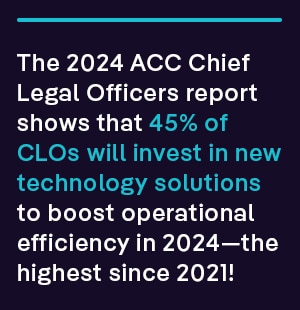 The 2024 ACC Chief Legal Officers report shows that 45% of Chief Legal Officers (CLOs) will invest in new technology solutions to boost operational efficiency in 2024—the highest since 2021! This surge highlights a growing awareness among organizations of how streamlined contract management can supercharge processes and reduce risks.
The good news is that these forward-thinking enterprises are evolving their contract lifecycle management functions with the help of artificial intelligence (AI).
Here is more about AI contract management— how it benefits contract managers and what its key features are, how to overcome adoption challenges, and what lies ahead for such leading-edge contract management.
The 2024 ACC Chief Legal Officers report shows that 45% of Chief Legal Officers (CLOs) will invest in new technology solutions to boost operational efficiency in 2024—the highest since 2021! This surge highlights a growing awareness among organizations of how streamlined contract management can supercharge processes and reduce risks.
The good news is that these forward-thinking enterprises are evolving their contract lifecycle management functions with the help of artificial intelligence (AI).
Here is more about AI contract management— how it benefits contract managers and what its key features are, how to overcome adoption challenges, and what lies ahead for such leading-edge contract management.
 too long to spend on a contract when companies hold thousands more, as mentioned above. But with AI-based contract management, a legal team can not only easily draft legal documents, identifying standard contract language, but also more effectively analyze contract data, pinpointing problematic agreement terms and clauses.
too long to spend on a contract when companies hold thousands more, as mentioned above. But with AI-based contract management, a legal team can not only easily draft legal documents, identifying standard contract language, but also more effectively analyze contract data, pinpointing problematic agreement terms and clauses.

 So clearly, AI contract management solutions come with many advantages. That is the reason why the majority of companies have long-term plans to use AI in their contracting, and a significant number are currently experimenting with the technology. Still, companies face challenges while undergoing a legal digital transformation—and that is the reason why more than half of first-time implementations fail to deliver the expected benefits, according to Gartner.
So clearly, AI contract management solutions come with many advantages. That is the reason why the majority of companies have long-term plans to use AI in their contracting, and a significant number are currently experimenting with the technology. Still, companies face challenges while undergoing a legal digital transformation—and that is the reason why more than half of first-time implementations fail to deliver the expected benefits, according to Gartner.
 Next, they would do well to do the following:
Next, they would do well to do the following:
 What is equally important during legal digital transformation is dealing with loss aversion quickly and effectively. That means senior leaders need to talk to employees who have reservations about digital changes taking place because they do not yet understand the potential gains from them. That amounts to reducing employees’ concerns about technological disruption and preventing push back on digital transformation projects.
Take data security and data privacy, for example. In the absence of top-notch cybersecurity measures, system vulnerabilities can happen through legal and other departments. This can lead to the grave misuse of the system and a serious breach of personal information. So, employees need to know that contract management systems have enough safety measures and data governance practices in place to protect the wealth of personal data and maintain people’s confidentiality. They need to be assured that there are limits on the length of time that data is kept, so that there are less chances of personal information being left exposed to breaches. And they need to know that data is anonymized and aggregated, with identifiable information removed from datasets, so that people’s privacy is further safeguarded.
What is equally important during legal digital transformation is dealing with loss aversion quickly and effectively. That means senior leaders need to talk to employees who have reservations about digital changes taking place because they do not yet understand the potential gains from them. That amounts to reducing employees’ concerns about technological disruption and preventing push back on digital transformation projects.
Take data security and data privacy, for example. In the absence of top-notch cybersecurity measures, system vulnerabilities can happen through legal and other departments. This can lead to the grave misuse of the system and a serious breach of personal information. So, employees need to know that contract management systems have enough safety measures and data governance practices in place to protect the wealth of personal data and maintain people’s confidentiality. They need to be assured that there are limits on the length of time that data is kept, so that there are less chances of personal information being left exposed to breaches. And they need to know that data is anonymized and aggregated, with identifiable information removed from datasets, so that people’s privacy is further safeguarded.
 systems are adept at understanding and responding to nuances in human contractual language, facilitating users’ interactions with their contract management platforms. But getting the most out of a system’s NPL features requires prioritizing users’ experience and pouring resources into employee NPL training, at the outset.
systems are adept at understanding and responding to nuances in human contractual language, facilitating users’ interactions with their contract management platforms. But getting the most out of a system’s NPL features requires prioritizing users’ experience and pouring resources into employee NPL training, at the outset.
 The 2024 ACC Chief Legal Officers report shows that 45% of Chief Legal Officers (CLOs) will invest in new technology solutions to boost operational efficiency in 2024—the highest since 2021! This surge highlights a growing awareness among organizations of how streamlined contract management can supercharge processes and reduce risks.
The good news is that these forward-thinking enterprises are evolving their contract lifecycle management functions with the help of artificial intelligence (AI).
Here is more about AI contract management— how it benefits contract managers and what its key features are, how to overcome adoption challenges, and what lies ahead for such leading-edge contract management.
The 2024 ACC Chief Legal Officers report shows that 45% of Chief Legal Officers (CLOs) will invest in new technology solutions to boost operational efficiency in 2024—the highest since 2021! This surge highlights a growing awareness among organizations of how streamlined contract management can supercharge processes and reduce risks.
The good news is that these forward-thinking enterprises are evolving their contract lifecycle management functions with the help of artificial intelligence (AI).
Here is more about AI contract management— how it benefits contract managers and what its key features are, how to overcome adoption challenges, and what lies ahead for such leading-edge contract management.
What is AI-Based Contract Management?
With increasing frequency, medium- and large-sized companies are outgrowing their older contract repositories and authoring tools — and manual way of contracting. More and more, they are realizing that AI is the difference-maker between average and advanced contract management. AI contract lifecycle management not only helps legal and business users create, store, review, index, retrieve, analyze, negotiate, and approve agreements, but also accelerates the contract assembly process for sell-side contracts, fast-tracks the contract review process for buy-side contracts, and provides deep insights into business performance across multiple departments.Benefits of Integrating AI in Contract Lifecycle Management
A legal team and its counterparts in sales, procurement, and finance can reap the full benefits of AI in contract management — from streamlining their contracting to better managing potential risk. It takes 92 minutes to review a single agreement, on average, which is far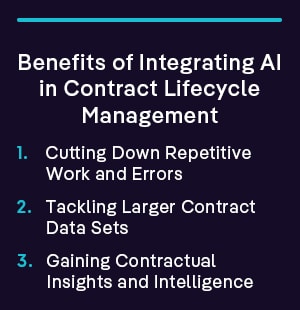 too long to spend on a contract when companies hold thousands more, as mentioned above. But with AI-based contract management, a legal team can not only easily draft legal documents, identifying standard contract language, but also more effectively analyze contract data, pinpointing problematic agreement terms and clauses.
too long to spend on a contract when companies hold thousands more, as mentioned above. But with AI-based contract management, a legal team can not only easily draft legal documents, identifying standard contract language, but also more effectively analyze contract data, pinpointing problematic agreement terms and clauses.
Cutting Down Repetitive Work and Errors
Contract management systems speed up the assembly of agreements while AI powers functionality to assure that terms are properly vetted. This allows legal professionals and their counterparts to spend less time on manual, monotonous review, and more time on higher-value work. This also reduces the chances of mistakes being made during the entire contracting process. After all, there are simply too many important dates, deadlines, and terms and conditions to catch with the human eye. When tasked with authoring agreements, sitting through multiple rounds of changes, or searching historical contracts for agreeable terms, contracting professionals may find the work flat out tiresome or lose focus on it altogether.Tackling Larger Contract Data Sets
Using natural language processing (NLP), AI-based contract management solutions assist in the search for specific terms and extraction of data points. Their handling of information from hundreds of thousands of agreements, at once, also allows them to discern patterns between each and make assumptions to create, edit, and finalize future agreements. In other words, they become the contract expert in companies, in addition to being the single source for truth.Gaining Contractual Insights and Intelligence
AI contract management systems can pore over agreements, and their data points, with speed and proficiency. They help contracting professionals determine things, such as how many contracts are up for renewal in the near future; how many contracts renewed for particular services, regions, or deal sizes historically; how long it takes to negotiate contracts, in general, and which professionals secure the most business; who is approving contracts using e-signatures; and which market trends will impact contracting professionals in the coming years.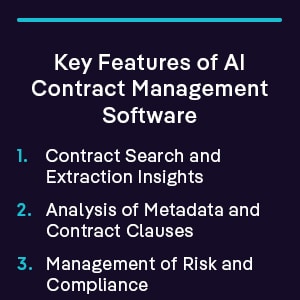
Key Features of AI Contract Management Software
Contract Search and Extraction of Insights
Here, the application of AI in contract management translates to the ability to sift through contracts, at scale, and cluster them based on custom and standard metrics. It means being able to quickly find agreements that use similar or identical clauses or terms. It means being able to evaluate the impact on individual contracts and making the necessary modifications in bulk. Just as importantly, applying AI helps with identifying key metrics, or KPIs, for specific contract groups, and deriving contract insights and anomalies — should there be any.Analysis of Metadata and Contract Clauses
Another key feature of AI-driven contract management is the ability to identify contract types and map them to existing contract templates; extract and classify contractual terms and metadata; and find and parse clauses, and match them with existing clause templates. It highlights the similarities between two clauses, during third-party contract review. It also keeps terms and clauses in accordance with a company’s templates and processes, by suggesting fallback and alternative clauses, during the contract request process, contract review process, and negotiations.Management of Risk and Compliance
Additionally, AI-based contract management helps with assessing and mitigating risk, by extracting obligations across agreement types and placing them in straightforward categories: financial and operational. They then identify and evaluate any number of compliance and regulatory terms, checking them against recent compliance or regulatory changes.Overcoming Challenges of AI Contract Management
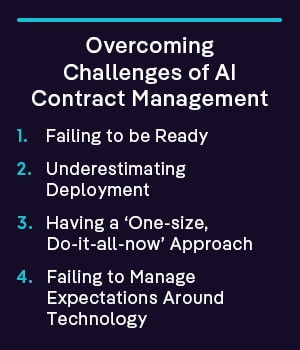 So clearly, AI contract management solutions come with many advantages. That is the reason why the majority of companies have long-term plans to use AI in their contracting, and a significant number are currently experimenting with the technology. Still, companies face challenges while undergoing a legal digital transformation—and that is the reason why more than half of first-time implementations fail to deliver the expected benefits, according to Gartner.
So clearly, AI contract management solutions come with many advantages. That is the reason why the majority of companies have long-term plans to use AI in their contracting, and a significant number are currently experimenting with the technology. Still, companies face challenges while undergoing a legal digital transformation—and that is the reason why more than half of first-time implementations fail to deliver the expected benefits, according to Gartner.
Failing to be Ready
Many companies view AI-based contract management platforms as a panacea to their contracting challenges. Although they succeed in configuring them to their current legal processes, they fail to prepare their departments before implementing them. This only creates roadblocks in the digital transformation journey.Underestimating Deployment
Companies also tend to discount the amount of work needed to automate contract management functions and processes for a broad spectrum of business units, other than legal, such as supply chain management and customer relations. But this only creates more obstacles for everyone.Having a ‘One-size, Do-it-all-now’ Approach
Whether migrating legacy agreements, automating contract templates — or, yes, trying to leverage AI— when companies try to introduce too many changes at once, they fail to deliver value to the business in a reasonable timeframe.Failing to Manage Expectations Around Technology
And whenever they introduce new technology to departments, companies tend to neglect user adoption in the first place. But failing to explain digital transformation goals to stakeholders and enlisting internal ‘digital champions’ is a formula for a disaster. Now, to implement AI contract management platforms more successfully, companies ought to properly size and scope their digital transformation projects, aligning them with current organizational requirements and long-term plans.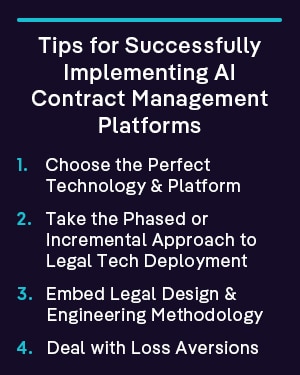 Next, they would do well to do the following:
Next, they would do well to do the following:
Choose the Perfect Technology Platform and Partner
What gets companies through the adoption stage successfully are selecting just the right technology platform and reliable digital transformation partner — or best-in-class implementation vendor. The latter will assess technical requirements and come up a broader project plan, before managing software configuration and initial platform usage. They will then provide a technology team to perform a full-system installation and integration; use project management tools to log and track support issues until resolution; provide online training and product demonstrations; and leverage artificial intelligence and machine learning (ML) to build out and deliver legal transformation. After all, companies do not want a partner and vendor that sells them a piece of technology but leaves them to their devices to figure out adoption and later deployment.Take the Phased or Incremental Approach to Legal Tech Deployment
In just about every digital transformation like AI contract management, it is crucial to articulate larger aims, spell out short-term or intermediate goals and benchmarks, and show the clearest measurable outcomes. By prioritizing an incremental transformation in this way, valuable lessons can be learned and appropriate changes, or corrective measures, can be made along the way. Unlike a big-bang-like event that has a greater chance of failure, this land-and-expand-phased approach leads companies through transformation readiness, delivery, and ultimate success. Additionally, it motivates companies to continue down the path of digital relevance — and even excellence. To put it another way, this is an agile technology deployment and, in the case of AI contract management, steadily evolves within a digital maturity model: the digitization of agreements and automation of contracting processes; the application of AI and the integration of multiple business apps in the contract management system — all leading to the rollout of a single legal platform.Embed Legal Design and Engineering Methodology
Carefully defining existing processes within legal and other departments is another best practice during legal technology deployment. And that calls for legal design thinking, or human-centered, methodology: documenting how contracts are executed and who is involved in approvals and final signature, company policies, and guidelines; visualizing where the company will be at the end of the digital transformation journey, such as in a position of having agreements automated, approved, and executed — partly or entirely in a digital legal environment; thinking about individual use case solutions by providing gap analyses based on historical and existing legal needs and desired digital state; and developing a transformation delivery plan. Once all of the above is achieved to everyone’s satisfaction, companies can adopt and configure whole new contract management systems by drawing out maps and charts for contracting processes.Deal with Loss Aversions
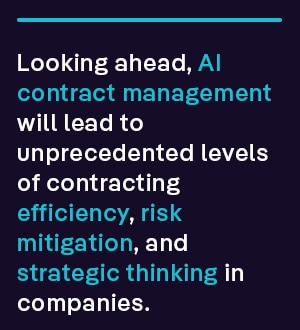 What is equally important during legal digital transformation is dealing with loss aversion quickly and effectively. That means senior leaders need to talk to employees who have reservations about digital changes taking place because they do not yet understand the potential gains from them. That amounts to reducing employees’ concerns about technological disruption and preventing push back on digital transformation projects.
Take data security and data privacy, for example. In the absence of top-notch cybersecurity measures, system vulnerabilities can happen through legal and other departments. This can lead to the grave misuse of the system and a serious breach of personal information. So, employees need to know that contract management systems have enough safety measures and data governance practices in place to protect the wealth of personal data and maintain people’s confidentiality. They need to be assured that there are limits on the length of time that data is kept, so that there are less chances of personal information being left exposed to breaches. And they need to know that data is anonymized and aggregated, with identifiable information removed from datasets, so that people’s privacy is further safeguarded.
What is equally important during legal digital transformation is dealing with loss aversion quickly and effectively. That means senior leaders need to talk to employees who have reservations about digital changes taking place because they do not yet understand the potential gains from them. That amounts to reducing employees’ concerns about technological disruption and preventing push back on digital transformation projects.
Take data security and data privacy, for example. In the absence of top-notch cybersecurity measures, system vulnerabilities can happen through legal and other departments. This can lead to the grave misuse of the system and a serious breach of personal information. So, employees need to know that contract management systems have enough safety measures and data governance practices in place to protect the wealth of personal data and maintain people’s confidentiality. They need to be assured that there are limits on the length of time that data is kept, so that there are less chances of personal information being left exposed to breaches. And they need to know that data is anonymized and aggregated, with identifiable information removed from datasets, so that people’s privacy is further safeguarded.
Future Trends in AI and Contract Lifecycle Management
Looking ahead, AI contract management will lead to unprecedented levels of contracting efficiency, risk mitigation, and strategic thinking in companies. But to continue reshaping their business and stay ahead of the curve, they would do well to keep a close eye on technological advancements.Natural Language Processing (NLP)
NLP is making day-to-day contract management more user-friendly and, therefore, far more accessible. NLP capabilities embedded in contract management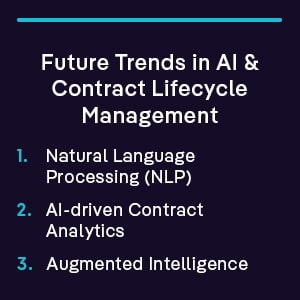 systems are adept at understanding and responding to nuances in human contractual language, facilitating users’ interactions with their contract management platforms. But getting the most out of a system’s NPL features requires prioritizing users’ experience and pouring resources into employee NPL training, at the outset.
systems are adept at understanding and responding to nuances in human contractual language, facilitating users’ interactions with their contract management platforms. But getting the most out of a system’s NPL features requires prioritizing users’ experience and pouring resources into employee NPL training, at the outset.
AI-driven Contract Analytics
As mentioned above, AI-driven contract analytics allows contract managers to extract crucial information from agreements, as efficiently and effectively as possible. And it will only continue to generate actionable insights, allowing for better understanding of obligations and opportunities, only from increasingly large datasets. But that means investing in the latest contract analytics tools—those that possess the ability to process unstructured contractual data at greater and greater speeds.Augmented Intelligence
Augmented intelligence is simply the enhancement of human capabilities through the integration of AI in everyday decision processes. By providing deep insights and offering key recommendations based on contract analysis, it is already helping senior leaders make more informed and strategic determinations about the business. But fully integrating AI with human expertise calls for a corporate culture that recognizes the value of collaboration between the two—and then fully leverages it.Getting Started with AI Contract Management Software
So, now that you know what artificial intelligence in contract lifecycle management is all about, why not embrace it for more efficient contracting in your organization? Just imagine: quick assembly of contracts and more accurate review of agreement terms, as well as deeper contractual insights and higher-level, strategic decision-making. Lawyer-led and AI-powered, the ContractPodAi Cloud platform helps legal professionals — and their counterparts in sales, procurement, and other departments — capture, process, and execute agreements, as well as gain reliable contractual insights. If you want to know more about our AI contract management solution, contact us today and request a demo.Unlock the Future of Legal with GenAI
Discover how Artificial Intelligence can transform your legal team's efficiency and productivity. Get actionable insights, strategic tips, and a framework for implementing GenAl in your legal workflows with our comprehensive guide.


